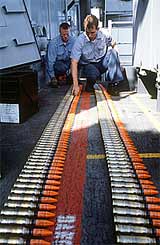A legitimate act is one that is both legal and accepted as such.
Should there be legal restrictions on the use of certain weapons in a war zone?
International agreements restricting the use of certain weapons already exist. The use of chemical and biological weapons is prohibited by law and, despite the recent development of so-called “Battlefield Nuclear Weapons”, awareness of the dreadful consequences of using nuclear weapons in war have so far been enough to discourage their use in recent regional wars. However there is ample evidence that chemical weapons were used by the Iraqi military against Kurdish civilians in the 1980s and that Depleted Uranium was used by the western powers in the first gulf war and during the present conflict in Iraq. Bomblets from cluster bombs scattered by Israeli forces in Lebanon continue to blow the legs off civilians and kill children months after the conflict ended.
It seems that international agreements restricting the use of certain weapons are often ignored during times of war.
 Raising questions
Raising questions
So what ethical principles should we be insisting that our military planners and decision makers follow? Choose a question and write out a response including both the evidence backing your claim and an explanation of how it does (a warrant).
 Nuclear Weapons:
Nuclear Weapons:
- Should Scientists be involved in the development of Nuclear weapons?
- Should conventional weapons which use depleted uranium be banned?
- Is direct action by peace campaigners justified
 War:
War:
- Is there such a thing as a “Just War”?
- Should there be legal restrictions on the use of certain weapons in a war zone?
- Are civilian casualties an acceptable price to pay to meet military objectives?

Useful website:  BBC Guide to the Ethics of War
BBC Guide to the Ethics of War
 Hiroshima and Nagasaki: Legal but was it legitimate?
Hiroshima and Nagasaki: Legal but was it legitimate?




 BBC Guide to the Ethics of War
BBC Guide to the Ethics of War Hiroshima and Nagasaki:
Hiroshima and Nagasaki:


What's your opinion?
Average rating




Not yet rated